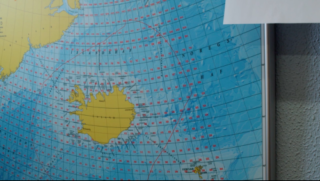
The Upcoming Polar Silk Road 2021
HD video, 9’46’’
Work selected by the public notice Cantica21. Italian Contemporary Art Everywhere – Over 35 Section (MAECI-DGSP/MiC-DGCC, 2020)
This work benefits from the generous support of [N.A!] Project
Elena Mazzi draws on anthropological methodologies to address points of tension in contemporary societies. She often works with communities involved in her subject of research to develop multidisciplinary tools for collaborative action and speculative thinking. The Upcoming Polar Silk Road expands Mazzi’s ongoing focus on neoliberal territorial exploitation for financial profit by investigating a new commercial route that connects China and Europe through a previously inaccessible Arctic passage. This novel ‘silk road’, made possible by the melting of the glaciers and the use of a fleet of icebreakers, will become a key passage for international trade, reducing by 15 days the travel time via the Suez Canal. Initiated in 2018 during a residency in Iceland, the investigation was conducted by the artist through visits to strategic sites and interviews with individuals connected to or affected by the project. The resulting work sheds light on the multiple geopolitical interests that operate in the Arctic region and the ways in which global warming is being used to enforce new infrastructural orders. The conflicting perspectives that emerge in the video expose a form of economic speculation on climate change at the service of neoliberal trade agendas.
Artist’s statement
The overall aim of my research practice is to investigate how context-specific art projects can critically analyse territories which have suffered or are suffering trauma or moments of crisis. Mostly following an anthropological approach, this analysis investigates and documents an identity that is both personal and collective, relates to a specific territory, and gives rise to different forms of exchange and transformation. It is about how the human being perceives the surrounding environment and decides to operate in it and make a change. This action is almost always determined by either a political or a social necessity, which could be defined in a moment of distress or crisis. That is why crises are so important for me: they can be seen as positive turns, and for this reason are analyzed through several different methodologies. I’ve been personally affected by a big earthquake in Italy that destroyed the town of L’Aquila in 2009, and this strongly affected my view on society and consequently my artistic practice.